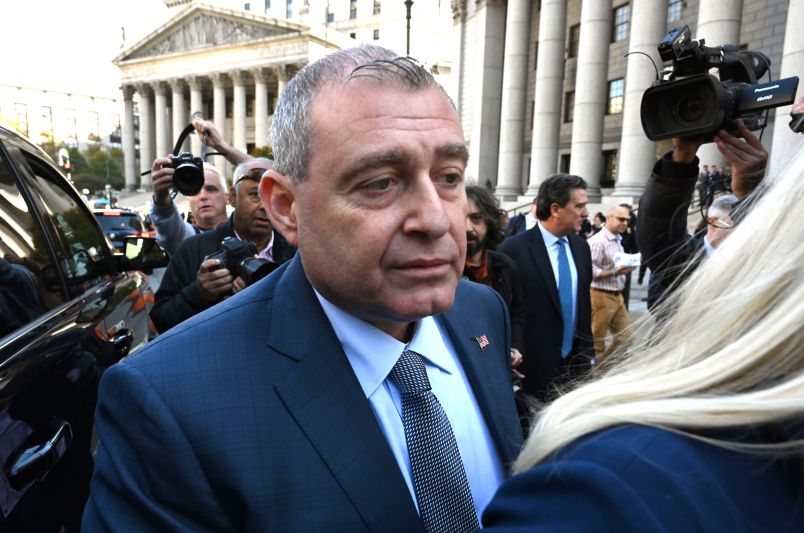NEW YORK — A Swiss lawyer for Ukrainian billionaire gas middleman Dmytro Firtash wired $1 million to Rudy Giuliani associate Lev Parnas’ wife in September 2019, prosecutors and an attorney for Parnas said on Tuesday.
The revelation came in a hearing where a Manhattan federal judge denied a request from the government to revoke Parnas’ bail agreement, after prosecutors had accused him of concealing the loan along with other financial information. The denial left Parnas’ previous bail package unchanged.
District Judge Paul Oetken for the Southern District of New York said that he recognized that there was a serious risk of flight but found that the “strict conditions that exist are appropriate.”
Assistant U.S. Attorney Rebekah Donaleski said that Parnas “poses an extraordinary risk of flight” during the hearing, and that he had “reported and unreported connections to the highest levels of government in Ukraine.”
She repeatedly referred to the $1 million transfer as “income,” saying that it had been “papered over” as an unsecured loan in a manner typical of money laundering from Eastern Europe into the United States.
Parnas attorney Joe Bondy said that the $1 million was an unsecured loan from a Swiss lawyer named Ralph Oswald Isenegger. Bondy told the court that he did not “pretend to understand how the extremely wealthy do their business.”
Bondy added that Isenegger had demanded Svetlana Parnas return the money after prosecutors raised it in court filings.
Donaleski said that the government only became aware of the $1 million from Firtash the day after agreeing to Parnas’ bail package. She said that her office immediately subpoenaed bank records for the transaction upon learning about it.
Bondy conceded that the $1 million was “loosely papered.”
Firtash has been stranded in Vienna since 2014, after a U.S. federal indictment on charges of foreign bribery was unsealed. Prosecutors have referred to him as an “upper echelon” member of the Russian mafia in court papers, while petitions for his extradition to the U.S. have stalled over the past five years.
Earlier this year, he hired Trump-aligned lawyers Joe diGenova and Victoria Toensing. The duo are also associates of Giuliani and Parnas, and said they hired Parnas to serve as a translator in their dealings with Firtash.
Bondy added that Parnas had “burned the bridge” between himself and Firtash and, by extension, with the law firm of Joe DiGenova and Victoria Toensing. The two Trumpworld attorneys will no longer speak with Parnas, Bondy averred.
The hearing featured detailed wrangling over Parnas’ financial status, and over whether or not he and his attorney intentionally lied to the government. At one point, Donaleski suggested that Bondy lied to the court in saying that Parnas only had $94,000 left in his bank account. Parnas “hired armed security to take his children to school,” Donaleski said, adding, “who is paying for that?”
“Even now, the government isn’t clear about the state of his finances,” Donaleski added.
Judge Oetken also questioned how Parnas had drained the $1 million to his wife in September to $94,000 in December, telling Bondy “I know you’re expensive, but not that expensive.”
Separately, prosecutors had accused Parnas’ counsel of lying to a south Florida pretrial services officer. Oetekn said that he had spoken with the officer in question, and agreed with prosecutors.
“He thought you were spinning it in a particular way,” Oetken told Bondy, adding “you do need to be careful in relaying what the court has said.”
Donaleski had said that it was a “close call” that Parnas did not succeed in fleeing, arguing that the bail’s purpose — “bankrupt[ing] his family if he fled” — was mooted by the Giuliani associate’s alleged dissembling.
But Oetken narrowed the issue in his ruling, and focused on what had changed since the government agreed to Parnas’ bail package in October.
The federal judge said at the end of the two-hour hearing that though the prosecutors had presented “concerning” and “suspicious” information, he was not sure if it “rises to the level” of revoking Parnas’ bail.
Donaleski had argued that Parnas repeatedly went close to “the line” without crossing it in his misstatements, but that the aggregate amount of alleged dissembling suggested that the Giuliani associate was intentionally misleading the court. Oetken, in his ruling, said that while Parnas had violated “the spirit” of the law, there was “no clear, direct misstatement” that he could identify.
Prosecutors accused Parnas last week of lying to the government about his finances and of telling his pretrial services officer that the judge had already loosened his conditions of release.
Specifically, Manhattan federal prosecutors said that Parnas had concealed the source of the September 2019 wire transfer, and suggested that he had downplayed the size of his wealth in order to get a lighter bail package.
Through his attorney, Parnas contested the claims in a Monday filing. He said that the issue with his pretrial services officer was a misunderstanding, and that any errors in his financial disclosures to the government were accidental, or due to the fact that his assets were registered to his wife.
Parnas was indicted in October on campaign finances charges along with his longtime associate Igor Fruman. In the months leading up to their dramatic arrest on a Washington-Dulles International Airport jetway, the pair had traveled extensively with Giuliani. They went with the former NYC mayor and U.S. Attorney for the Southern District of New York to Poland and France, and campaigned with him during the 2018 midterms.
Manhattan federal prosecutors are reportedly examining Giuliani’s financial activities and ties to Parnas and Fruman in a criminal inquiry. They have also indicated that additional charges against Parnas and Fruman are “likely.”






